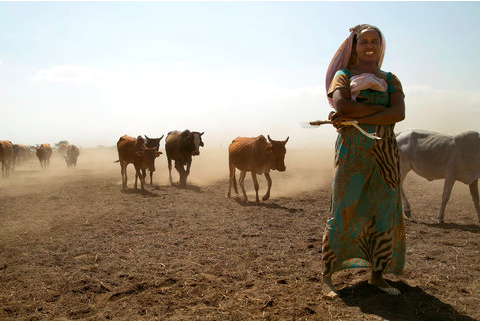NEWS Here’s Why There’s a Searing Ethiopian Drought Without an Epic Ethiopian Famine
Interesting piece by Andy Revkin on famines: Amartya Sen was right!
I hope you’ll read “Is the Era of Great Famine Over,” an Op-Ed article by Alex de Waal, the executive director of the World Peace Foundation at Tufts University, which has a program tracking famine trends.
Filing from Ethiopia, which is in the midst of a potent drought but — for a change — not a calamitous famine, de Waal made these core points:
How did Ethiopia go from being the world’s symbol of mass famines to fending off starvation? Thanks partly to some good fortune, but mostly to peace, greater transparency and prudent planning. Ethiopia’s success in averting another disaster is confirmation that famine is elective because, at its core, it is an artifact and a tool of political repression.
It’s worth stressing that last line:
[F]amine is elective because, at its core, it is an artifact and a tool of political repression.
Please read the entire article and consider the trend against what has been learned by scholars like Joshua Goldstein and Steven Pinker about death rates from war and violence; declines in deep poverty as shown by Max Roser; and child mortality rates from the World Health Organization.
There’s a valuable deeper dive on global famine trends on the Tufts website.

Over all, human prospects continue to improve.
Setbacks are nearly always the result of ruptures in governance or unchecked extremism and violence. Click back to Nick Kristof’s searing commentary from South Sudan last year for another example. Here was his conclusion, even as he witnessed people collapsing on the street:
You might think that what’s needed to end a famine is food. Actually, what’s essential above all is an international push of intensive diplomacy and targeted sanctions to reach a compromise peace deal and end the civil war.
While the general picture is brightening, trend is not destiny, and, of course, the non-human world is not doing nearly as well.
But with sustained citizen engagement, increased monitoring and transparency, more “mundane science” (in the best sense, as conveyed by Dan Kammen and Michael Dove) and pressure on despots and other bad actors, chances of up-side surprises remain high.
Postscript | Don’t miss the slide show on the political roots of a host of great famines that accompanies the de Waal article.

You must be logged in to post a comment.